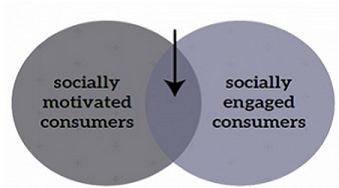 Hill+Knowlton Strategies/Research+Data Insights study identifies segment of consumers whose bond with companies strengthens through communication about commitment to social good and who can become reputation advocates
Hill+Knowlton Strategies/Research+Data Insights study identifies segment of consumers whose bond with companies strengthens through communication about commitment to social good and who can become reputation advocates
In the digital age, corporate communications can no longer occur in silos. A company’s marketing messages must match up with its reputational goals, and the behavior of the company is scrutinized through the lens of what it promises versus how it performs. At Hill+Knowlton Strategies, we call this alignment of promise and performance “character.”
“We’re learning that broadly proclaiming your CSR efforts and accomplishments may not always be the most efficient use of your budget”
In 2013, H+K released a study on Communicating Character® that reinforces this concept. The study showed that consumers are increasingly looking for companies whose brand promise, reputation and behavior are closely aligned. The research also demonstrated that consumers rely heavily on input from their peers to make decisions about which companies to do business with.

Now, a new study conducted by H+K Strategies’ research arm Research+Data Insights (RDI) reveals an opportunity for companies to communicate their character to consumers in an even more targeted way, demonstrating what companies are doing to deliver against their brand promise as it relates to corporate social responsibility (CSR) – a business’s commitment to doing social good. CSR can take many forms: how a company treats employees, vendors or suppliers; how it sources its goods; how green it is; how much it gives back to the communities it serves; and so on.
The research identified four consumer profiles:
17 percent of consumers are Socially Conscious Consumers, who seek out and selectively engage with companies aligned with their own values, even if goods or services cost more.
44 percent of consumers are Pragmatic Consumers, who hold corporations accountable for their actions, but whose shopping decisions are based primarily on personal factors, like cost or location.
24 percent of consumers are Passive Consumers, who are motivated strongly by the cost of goods and services, regardless of corporate behavior.
14 percent of consumers are Transaction Consumers, who do not believe that where you shop makes a difference and who believe that companies should focus squarely on the business.
In short, while price, quality and customer service all have an impact on customer relationships, CSR efforts can become primary decision points for socially motivated consumers. For example, fewer than half of Socially Conscious Consumers prioritize price when choosing where to take their business, compared with three-quarters of Pragmatic Consumers and nearly 90 percent of Passive and Transaction Consumers. Instead, 9 out of 10 Socially Conscious Consumers say that fair wages, environmentally friendly products and responsible sourcing are either the number-one thing they consider or would weigh heavily on their decision where to shop. Similarly, 88 percent of Socially Conscious Consumers prefer to do business with companies that are sustainable, and 87 percent prefer companies that are honest.
Communicating about CSR efforts strengthens your bond with Socially Conscious Consumers. In short, the customers who care most about corporate responsibility – and who are your biggest allies – are like any other business segment and benefit from specific marketing and communications plans.
“We’re learning that broadly proclaiming your CSR efforts and accomplishments may not always be the most efficient use of your budget,” said Michael Lustina, president and COO of RDI. “In fact, it can sometimes be detrimental. Instead, we’re encouraging our clients to take the time to identify the customers whose business decisions are most strongly driven by a company’s commitment to corporate social responsibility, and then communicate with this smaller consumer audience as allies and advocates – people who share your core beliefs and values and who will act with you or on your behalf to help you achieve your CSR goals. In the end, it is a much more effective way to share your story.”
The new research also shows that a segment of Socially Conscious Consumers—about 8 percent of the public—are also active on- and off-line, and are more likely than their peers to engage in activities—such as boycotts or letter-writing campaigns—to support companies that share their values, or to oppose companies that do not demonstrate good behavior.
We call this 8 percent Influential Reputation Advocates—customers who share a company’s values, support their efforts to contribute to communities and are socially active in ways that impact their peers’ perceptions and purchasing decisions. The research indicates that focusing the strongest CSR communications on this influential sub-segment is the optimal way to share CSR initiatives without alienating customers at one end of the spectrum or ignoring the expectations and needs of socially motivated consumers at the other end.
Communicating Character® isn’t just about making a promise, delivering against that promise and then telling your stakeholders you’ve delivered. It’s a highly nuanced undertaking, and companies that are looking to communicate with character must take the time to learn about their customers and other key stakeholders and adjust their communications plans to achieve optimal positive impacts in customer perceptions.

